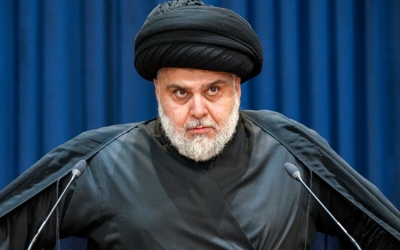Iraq parliament legal advisor rules Sadrist MPs' resignations illegal

The resignations of the 73 MPs of the Sadrist bloc were illegal and it was not within the Iraqi parliament speaker’s authority to authorise them, the parliament's legal advisor has ruled.
According to a letter sent to parliament by legal advisor Muhammad al-Ghazi, and seen by Middle East Eye, the MPs’ resignations did not follow the necessary processes, therefore the Sadrists are still MPs.
Parliament needs to conduct technical and legal discussions and put the resignations to a vote, Ghazi says, “because of its impact on the real representation of the House of Representatives”.
Two Sadrist leaders welcomed the news and told MEE that the movement’s return to parliament has become a necessity and inevitable reality, insisting there was no alternative to ending Iraq’s political crisis than this.
The movement of influential Shia cleric Muqtada al-Sadr emerged from the elections in October last year as the largest party, winning 73 seats.
New MEE newsletter: Jerusalem Dispatch
Sign up to get the latest insights and analysis on Israel-Palestine, alongside Turkey Unpacked and other MEE newsletters
Sadr then attempted to form a government with his Sunni and Kurdish allies that would have marginalised Iranian-backed Shia factions.
However, his rivals frustrated all his attempts, boycotting parliament and blocking the election of a new president, which is necessary before a new government can be formed.
Outraged, in June Sadr ordered his MPs to resign, which was accepted by Speaker Mohammed al-Halbousi. Those MPs were then replaced by candidates who had come in second place, the majority Sadr’s opponents.
Over time that move appeared to be a misstep, and as tensions grew Sadr’s protesters staged protests in Baghdad’s Green Zone that eventually provoked a deadly backlash that saw clashes between Sadrists and security forces and Iran-backed paramilitaries last month.
Iraq has since remained at an impasse, and it is currently unknown whether Ghazi’s intervention is part of a political settlement agreed upon with the Sadrists. The position of Sadr’s Iranian-backed opponents is also unknown.
However, political leaders and MPs told MEE that the alternative to accepting the judgement could be chaos.
On social media, middle-ranking members of the Iranian-backed political forces have begun displaying surprise at this latest development, and opposition to discussing the validity of the Sadrists resignations once again.
Regional and international players have over the past few months placed great pressure on Sadr in an attempt to persuade him to find a way to return his MPs to parliament “to return the battle to its legal contexts”, according to a Shia political leader familiar with the talks.
This is a developing story…
Middle East Eye delivers independent and unrivalled coverage and analysis of the Middle East, North Africa and beyond. To learn more about republishing this content and the associated fees, please fill out this form. More about MEE can be found here.





